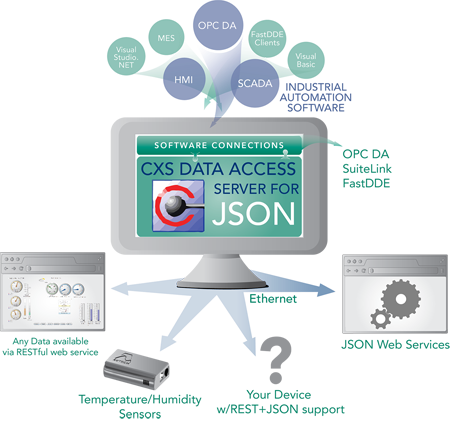You may have heard the terms OPC tunnel or tunneling of OPC data before and not have known exactly what the terms meant. In this blog post, we will explain what people mean when they talk about an OPC tunnel or tunneling of OPC data. In order to explain what the terms mean, we need to first understand how OPC data is exchanged between an OPC server and an OPC client.
Software Toolbox Technical Blog
Tunneling OPC Data – What Is It?
3 min read
By Win Worrall on Mar 16, 2016 5:18:14 PM
Connect Your HMI/SCADA to Barcode Scanners
5 min read
By Kevin Rutherford on Jan 28, 2016 1:59:16 PM
Barcode scanners are one of those types of devices that are extremely common in a variety of industries, whether it's for use in a manufacturing process or for cataloging inventory or a multitude of other possible uses. But how do you go from scanning a barcode to making that barcode data available to your monitoring applications such as an HMI or a SCADA?
Over the years of working in the automation software realm, I've seen dozens of clients have this seemingly basic need to bring barcodes up into various software packages. Regardless of the make/model of the scanner, the process is almost identical. For example, you could connect to a DataLogic scanner in under five minutes. (Click for How-To Video)
This post will cover the steps for bridging that gap between your scanners and your client applications.
Five Sources of Actionable JSON Data for Your HMI/SCADA/MES
4 min read
By Kevin Rutherford on Dec 16, 2015 11:25:32 AM
Trends are moving towards making smarter operating decisions based on actionable information, whether you're in the manufacturing space, oil/gas, power/utilities or other industries where outside variables can substantially impact the bottomline.
Having access to current and historical information on all of those outside variables is key to having "smart" operations that maximize profits in the most efficient manner possible.
We're going to discuss several sources of such important outside variables that, in the past, may have been difficult to integrate into a control system such as an HMI, SCADA or MES and how they are now available in an easy-to-consume, JSON RESTful web services format.
3 Considerations for Maximizing Uptime over Serial Radio Networks
2 min read
By Kevin Rutherford on Dec 8, 2015 4:26:17 PM
With the majority of companies in the oil, gas, railroad, water, wastewater, mining and power/utilities industries requiring wide area distributed radio networks for communications, engineers in charge of these radio networks have the daunting task of maintaining the highest level of performance and uptime at all times.
Given that you're reading this, I will choose to make the assumption that you are either an engineer in charge of such a radio network or that you've had some interaction on some level with such a radio network and it may not have been an altogether pleasant experience.
We're going to discuss a few things to keep in mind if you're interested in getting the most uptime possible out of your serial radios (and, let's face it, why wouldn't you want that).
About this Blog
We're engineers like you, so this blog focuses on "How to" appnotes, videos, tech team tips, product update announcements, user case studies, and other technical updates. Subscribe to updates below. Your feedback and questions on posts are always welcomed.
Subscribe to our Blog
Recent Posts
Posts by Topic
- Device Connectivity (204)
- Wonderware (178)
- OPC UA (121)
- Cogent DataHub (110)
- TOP Server (106)
- OPC (103)
- Technical Support (99)
- OmniServer (72)
- Video Tutorials (69)
- OPC Router (51)
- OPC DA (42)
- Protocols (40)
- AVEVA (37)
- Automation 101 (28)
- Security (26)
- MQTT & IoT (24)
- OmniServer Did You Know (24)
- Data Tunneling (23)
- OPC Data Client (22)
- Connectivity (21)
- Development Tools (19)
- IT/OT (18)
- DCOM (17)
- LGH (14)
- OPC Tunnel (13)
- Alarms & Notifications (12)
- Database (12)
- Earth Day (12)
- Summer of IoT (12)
- Exploring OPC UA (11)
- OPC Gateway (11)
- Case Studies (10)
- Dream Report (10)
- EFM (10)
- Oil & Gas (10)
- REST & Web Services (10)
- Reporting (10)
- CSV (9)
- Database & Historian (9)
- Flow (8)
- OPC Integration (8)
- Redundancy (8)
- Sustainability (8)
- AVEVA OPC UA Client (7)
- Modbus (7)
- OPC Router Basic Training (7)
- OPC Server (7)
- SuiteLink (7)
- DataHub Training (6)
- ODBC (6)
- OPC Alarms and Events (6)
- OPC Data Logger (6)
- ProtocolDesign (6)
- xml (6)
- Data Bridging (5)
- Data Logging (5)
- Data Storage Deep Dive (5)
- OPC Conversion (5)
- Data Integration (4)
- InTouch (4)
- Industrial Decisions (4)
- OPC Bridge (4)
- OPC Toolkit Benefits (4)
- OmniServer User Stories (4)
- SLIK-DA (4)
- SQL (4)
- Business Intelligence (3)
- Error Detection (3)
- IT & Infrastructure (3)
- Industry 4.0 (3)
- OPC Redundancy (3)
- OPC Server Remote Config (3)
- Wedges (3)
- Windows (3)
- Collaboration (2)
- ControlLogix (2)
- Excel (2)
- Ignition (2)
- KEPServerEX (2)
- OPC Wizard (2)
- OSIsoft (2)
- Omron (2)
- PGAS (2)
- Predictive Maintenance (2)
- Process Alert (2)
- Scripting (2)
- Store and Forward (2)
- System Integrators (2)
- Building Automation (1)
- ERP (1)
- Kepware Edge (1)
- LGH User Stories (1)
- LRC (1)
- Linux (1)
- Machine Learning (1)
- Mining/Metals (1)
- Omni Flow (1)
- Power & Utilities (1)
- Predictive Analytics (1)
- Process Alerts (1)
- QNX (1)
- Sparkplug B (1)
- Water & Wastewater (1)





